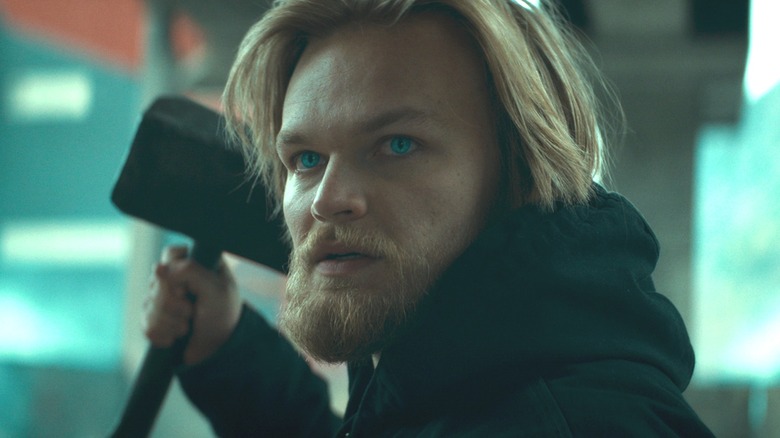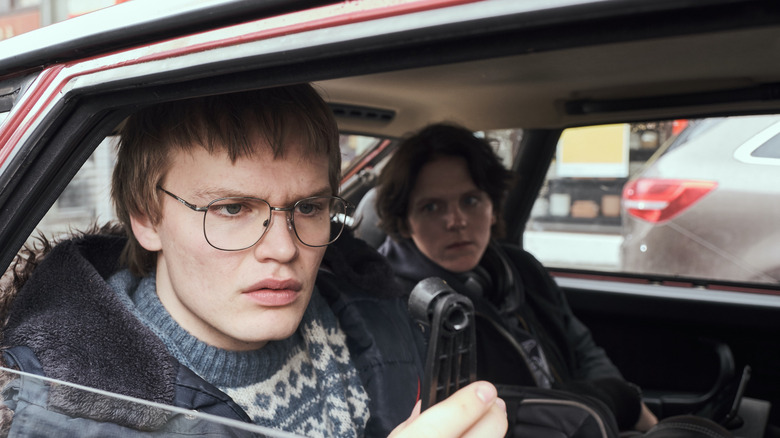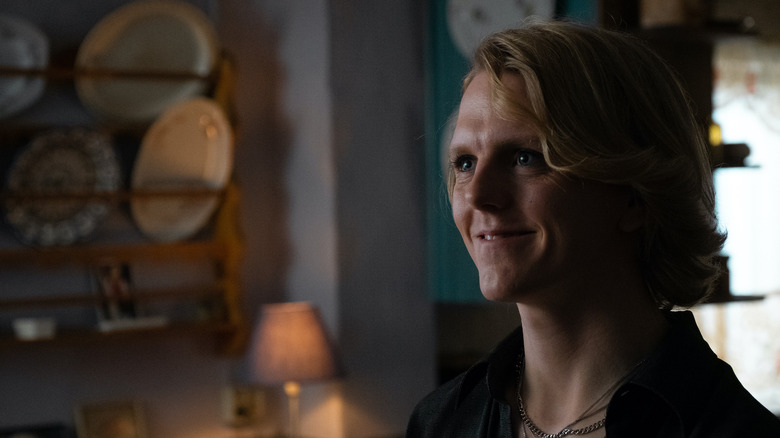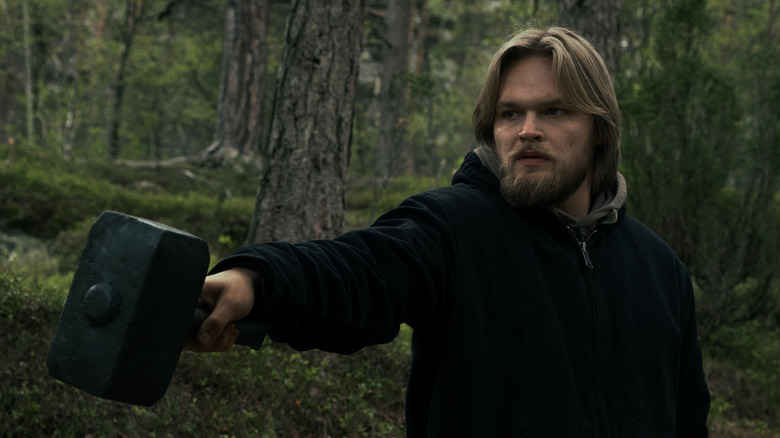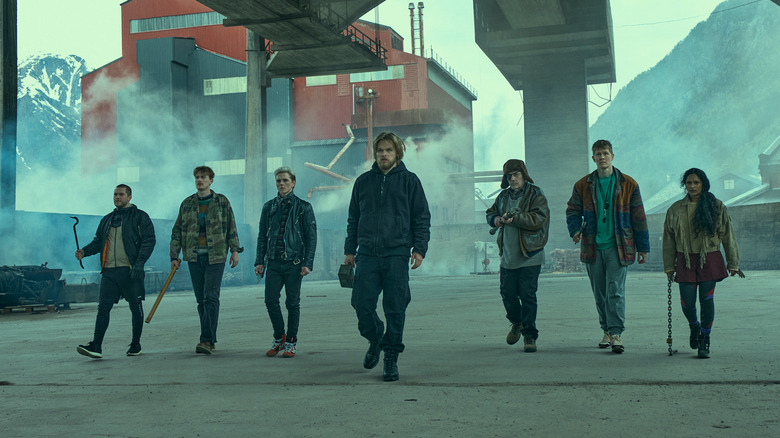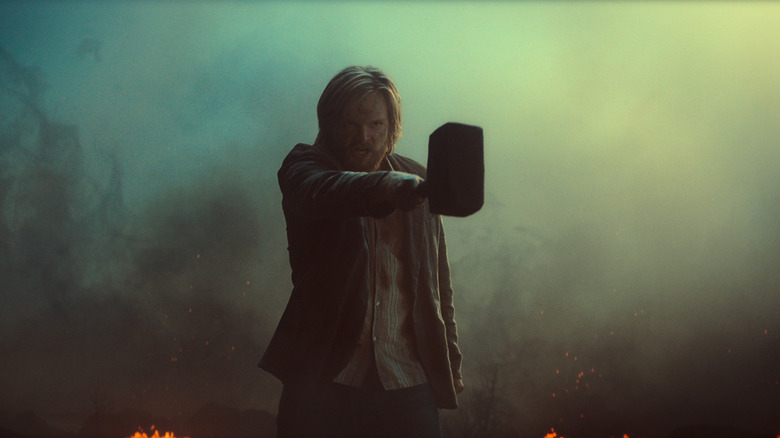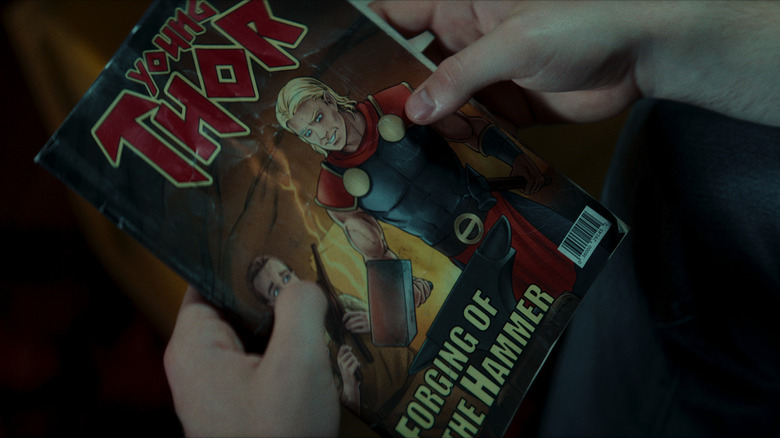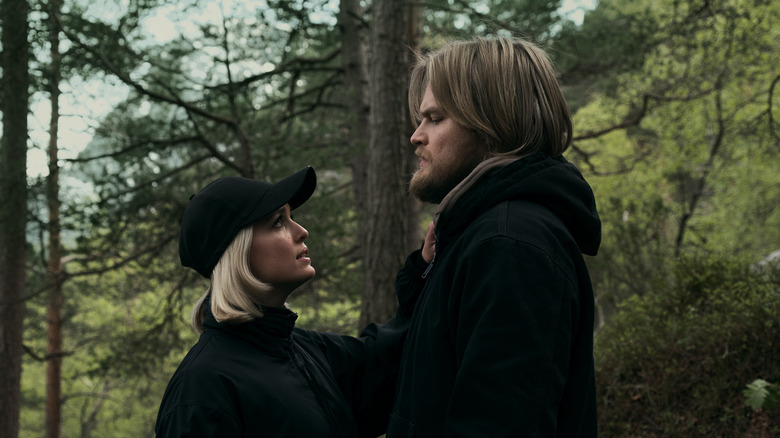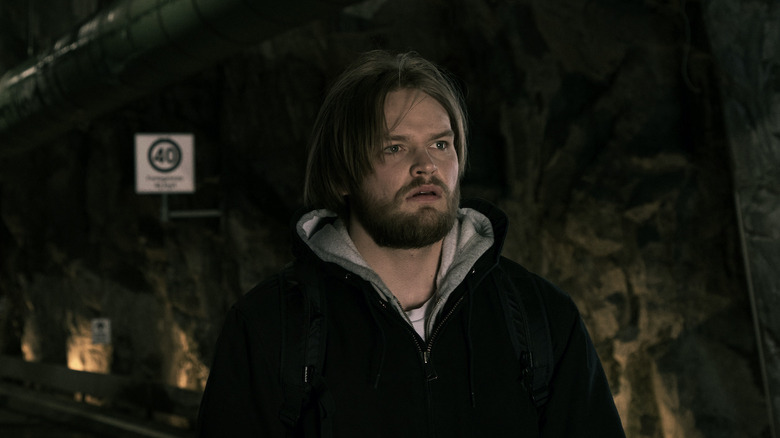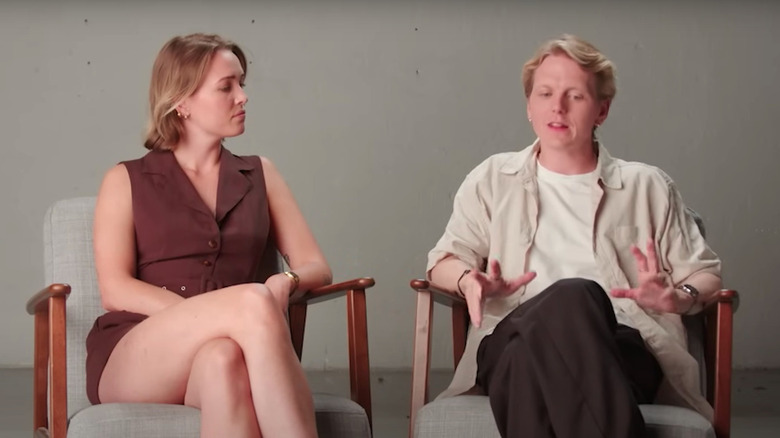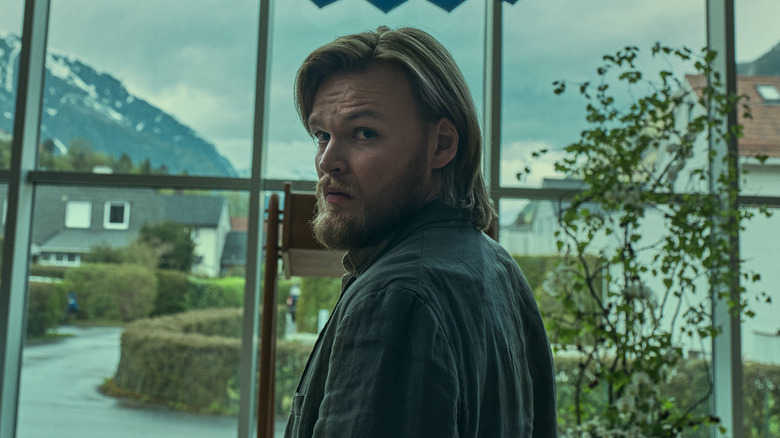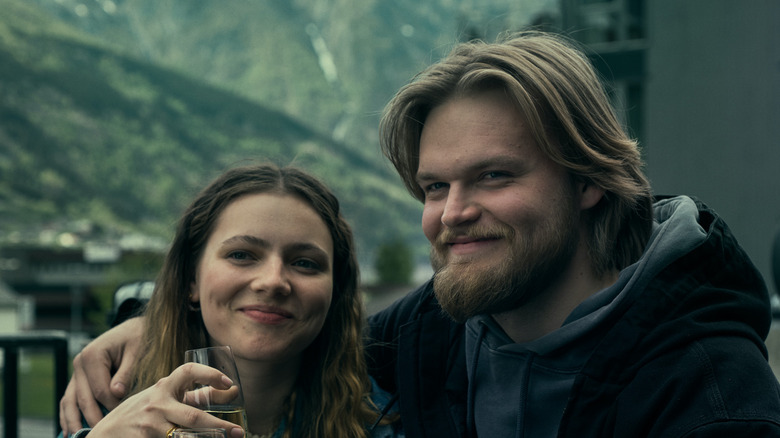The Ending Of Netflix's Ragnarok Season 3 Explained
"Ragnarok" has treated us to three seasons of gods, giants, and high school drama. The Norwegian show on Netflix tells the tale of Magne (David Stakston), a high school outcast who, upon arrival in Edda, has the power of Thor infused in him. The first season had him figuring out what had happened to him, while mourning the death of his only friend, Isolde (Ylva Bjørkaas Thedin). The second season saw him team up with other gods and forging his hammer, Mjolnir, while protesting the sins of the company known as Jutul Industries. But the third season is a different beast entirely.
About a year has passed since the second season and Magne is now under the spell of his hammer, acting unlike himself. He'll stay that way until he can be the one in control of Mjolnir instead of the other way around. But in the meantime, he's got a battle to prepare for (the title battle, in fact): Ragnarok. With the third and final season of "Ragnarok," the show wraps up its story with the perfect mix of teen angst, gods, and monsters. Here's the ending of Season 3 of Netflix's "Ragnarok" explained.
What you need to remember about the plot of Ragnarok
In the first season of "Ragnarok," after moving to Edda and becoming the reincarnation of Thor, Magne becomes friends with Isolde, a climate-change activist. One day, when he and Isolde hike up a glacier for evidence of wrongdoing by Jutul Industries, Magne gets a call from his half-brother Laurits (Jonas Strand Gravli) about his mother and leaves. Meanwhile, the head of Jutul Industries, Vidar (Gísli Örn Garđarsson), is also in the mountains. He strips, stalks a reindeer, tears its heart out, and eats it.
Magne gets home but it turns out to be a false alarm, so he starts to return to Isolde. He watches as Isolde paraglides off the mountain, but she hits the power lines and is killed. The students at the school mourn Isolde's death while Vidar admits to Ran (Synnøve Macody Lund), his so-called wife, that he killed her. It turns out Vidar and the rest of the Jutuls — including Magne's classmates Fjor (Herman Tømmeraas) and Saxa (Theresa Frostad Eggesbø) — are immortal giants.
Magne realizes when Vidar cuts up reindeer meat during a camping trip that it smells like Isolde's jacket when she died. He tells Vidar he won't get away with killing her, so Vidar sends his dog, a hellhound named Thrym, after Magne, who eventually kills it. The Jutuls want to punish Magne for Thrym's death. Among other punishments, they order him to attend a psychological evaluation, but Magne refuses to take the drugs for schizophrenia he's given.
Loki and Mjolnir
When the second season starts, more gods join Magne's fight. At the same time, Laurits is told by their mother (Henriette Steenstrup) that she had an affair with Vidar, who is Laurits' biological father. Laurits becomes half-giant, half-god, the reincarnation of Loki. Later, Laurits has emergency surgery to remove a tapeworm, which turns out to be Jörmungandr, the serpent that could put its body around the world. He takes it home.
Magne fights Vidar, killing him. He then gets the group of gods to infiltrate Jutul Industries to forge the hammer, Mjolnir. Later, Laurits releases the serpent into the fjord to grow as Ran and Fjor look on.
In Season 3 the group of gods has split up, and Magne has a new look — with a full beard — and a new girlfriend, Signy (Billie Barker). But as Mjolnir, the hammer, takes over Magne, Magne becomes overconfident and dumps Signy. The man who is the reincarnation of Odin (Bjørn Sundquist) takes him into the woods and teaches him to have control over the hammer, instead of letting the hammer control him. The seven gods then assemble for the title battle: Ragnarok.
What happened at the end of the show
The gods meet the giants in a deserted area, but as Saxa runs towards them with a spear from the old world — the only thing that can kill them — Magne screams, "Stop!" He says that the giants don't stand a chance against the hammer. He throws the hammer away and asks them to put their weapons down. They do, realizing they have to choose between death and a new world order. Fjor signs the company over to Saxa, and the battle between the gods and giants comes to an end. While this seems like the end of the show, it's actually the end of the fifth episode. There's one more episode to go.
The sixth episode sees the final battle play out as it once did in the mountains of Edda, with each individual god portraying themselves while the giants, the Jutuls, fight against them. But it's all in Magne's mind. The fight starts at Magne and Laurits' graduation, with a child accidentally shooting the person who is the reincarnation of Balder with an arrow, and ends with everyone dead but Magne/Thor. Magne/Thor is then bitten by Loki's serpent. He takes nine steps and dies in Magne's imagination, but in reality he drops to his knees in front of Signy, who's telling him how she feels. He reaches for her and they embrace.
Magne meets Signy, Laurits, and others for a toast to their graduation. Isolde is sitting among them, but only Magne sees her.
Why did Magne call off the final battle in the penultimate episode?
In the penultimate episode Magne and the other gods are prepared to fight the giants, but when the battle starts with Saxa running toward the gods, Magne calls the conflict off. He says there's "another way" to go about finding peace. It seems that he is hoping to avoid bloodshed even though, with his seven gods versus the three giants, the bloodshed on the giants' side would have been worse.
However, the gods wouldn't have avoided bloodshed entirely. As a result, Magne decides to forego any fighting and instead forges peace with the Jutuls. That peace requires the Jutuls to stop abusing their positions of power and do the right thing with their company. So Fjor signs the company over to Saxa, who takes meetings with environmental activists so the company can go green — a good outcome for everyone in Edda. In the meantime, the gods all go their separate ways and lead their own successful lives.
Why did Magne imagine the final battle in the last episode?
The final episode establishes that Magne has been living largely in his head while he has been in Edda. This is apparently the first time we've seen things from an objective perspective and it shows us that Magne is imagining the final battle, Ragnarok. In fact, Magne has imagined all the mythological events throughout the whole series. So while Ragnarok is the only battle we see from an objective perspective, the rest of the show's battles and struggles could be assumed to also be in his head.
He has been imagining the final battle, and all of the mythological events of the show, because he's been grappling with who he is and how he becomes a man. The show ultimately is about Magne's journey from childhood to adulthood and how he navigates those choppy waters. His last time fantasizing, at least at that scale, is the last episode, when he imagines Ragnarok. When he takes the final nine steps and drops his hammer in the fantasy world, he is essentially letting go of the fantasy and choosing to live in the real world. So when he dies as Thor in the fantasy world, it's a symbol of the death of his childhood and the end of his need for fantasy.
Did Magne really imagine other things throughout the show?
The director of the series, Mogens Hagedorn, wrote on Instagram, "[Magne's] fantasy is based on real events, but he molds them to fit into his Norse Mythology fantasy. So he must have had some interactions with Saxa, but only some innocent ones, that she hardly [would] have noticed." Based on this, it's safe to say that a majority of the events we've seen have been in his head, based on comic books and other sources, and his doctor was perhaps correct about his schizophrenia diagnosis after all.
The problem with this is that, for the first two seasons at least, it seemed like they were leaning into the mythology, not away from it. So a great deal of the things that happened — such as Vidar killing and eating the reindeer's heart, Ran going to a counselor for help with the difficulties of being a giant and a principal, and Laurits taking care of the serpent — don't work unless they're real. Because TV is open to interpretation, you're free to believe all but the final battle is real in "Ragnarok," as that would take care of some of the problems. Then the final battle in Magne's head is simply him saying goodbye to the part of his life that was driven by myth. However, if what Hagedorn has said is to be believed, you'd have to watch the show a second time to see how Magne spins each and every event into his own personal fantasy — and judge if this is possible.
What's up with Magne's personality in Season 3?
Magne goes from being a shy, humble kid in Seasons 1 and 2 to being an overconfident jerk in the third season. This is supposed to represent the hold the hammer has over him as the young god of thunder, Thor. The hammer has a will of its own, and in theory, Magne is under its spell. The problem is that he has a lot of trouble gaining control over the hammer, instead of letting it control him.
In the episode where the sea serpent swallows his hammer, he has a chance to get rid of the arrogance that the hammer has infused him with, but it seems that it only allows him to snap out of it long enough to break up with Saxa, who he takes up with after Signy, and stop wearing the clothes she wants him to wear. When Magne regains the hammer, he goes off on his own again, as if he just needs the hammer. It isn't until the god who is the reincarnation of Odin takes him into the woods and gets him to admit that he's still afraid of letting Signy and Isolde down that he gets himself back. It's a nice tribute to Magne's friends, but Magne's grandiosity is beyond anything that could be justified by his fears.
Why is the show so different in Season 3?
Season 3 of the show feels different from Seasons 1 and 2. While the first and second season spent a lot of time worrying about the sins of Jutul Industries and how Magne works his way into that fight, the third season deals more with Magne's personality changes and getting him ready for the final battle. It's not clear why this happens or even if it was intended.
There are fewer scenes at the Jutul factory and generally fewer people in the scenes, so perhaps there were budget cuts that necessitated the change. On the other hand, the showrunners could have known "Ragnarok" only had one more season to go, and therefore, chosen to focus more specifically on wrapping up Magne's story. One way or another, though, the story seems to have gotten away from the tale that seemed to drive it in Seasons 1 and 2.
What the cast has said about the ending
The cast was interviewed about the ending for a Netflix Nordic publicity video and they had a lot to say. Mostly they were positive about the ending. For example, Theresa Frostad Eggesbø, who plays Saxa, said, "I think it's great because it's been this fantasy series with Thor and Norse mythology but suddenly it became an origin story. It reflects the battle a young man might have with himself or with masculinity, or what it means to be a man in today's society." Jonas Strand Gravli (Laurits) noted, "I think it's great that there is this vulnerability to Magne's story and that Season 3 was able to capture that."
But that doesn't mean there weren't some misgivings. For example, Gravli observed, "I thought the series was going to go in another direction. I'm very happy that I got this surprise in Season 3." Furthermore, Herman Tømmeraas, who plays Fjor, said, "I think the fans will have a very mixed reaction." Clearly the cast was somewhat surprised with the ending but are trying to put a good spin on it.
What critics are saying about the ending
There aren't a lot of critics' reviews for the series but the ones that exist are underwhelming at best. For example, The Review Geek writes, "The final two episodes are some of the most anticlimactic drama seen in a fantasy series in quite some time ... The final episode leaves numerous plot holes and contrivances in its wake, with the six episodes mostly teasing Ragnarok coming and Magne flip-flopping faster than a WWE wrestler between good and bad."
Similarly, Ready Steady Cut notes, "[Season 3 of 'Ragnarok'] provides a lackluster conclusion to the series by confusing its mythological metaphors for ambiguous cop-out and trying to build an overarching theme of peace and understanding that feels at odds with previous events and characterization." These comments are typical of both critics' and audiences' reviews of the ending. Both lament the third season, and the last episode in particular, as an anticlimactic letdown that doesn't do justice to the themes established in the first two seasons.
Why did Ragnarok end with Season 3?
While it is often Netflix that makes the decision about whether a show will continue, especially in the third or fourth season, it seems in this case, it was the creators and crew of the show. "Throughout the recording there was a constant dialogue with Emilie [Lebech Kaae] and Adam [Price], the writers, and Mogens [Hagedorn], the director, and we agreed that we thought three was a good number for us," David Stakston said, confirming that the creators made the decision.
Despite that, due to the odd nature of the third season, there has been speculation that Price and Lebech Kaae were under pressure to wrap it up. Many fans have expressed surprise and disappointment with the way the show ended, abruptly tearing the rug out from under viewers by making all the mythological things happen in Magne's imagination. One way or another, though, the writers have created an ending that they can't come back from, so the show will end with Season 3.
